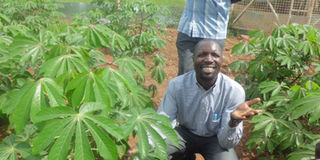Farmers optimistic on disease resistant cassava varieties

Finally, there seems to be a ray of hope for farmers growing cassava, writes Lominda Afedraru
Charles Ogang is the president Uganda Farmers Federation and a cassava farmer growing the crop on part of his more than 60 acre land at Akokoro Village in Apac district. To him cassava is regarded as food security crop in Lango sub region because it is the main staple food crop consumed in all homesteads throughout the year.
He has been growing cassava besides other types of crops like maize and beans right from his childhood but embarked on large scale commercial farming in the 1990’s.
However, Ogang just like other farmers has been faced with the challenge of Cassava Brown Streak Virus (CBSV) which is ravaging the crop in farmers’ fields across the country. The disease leads to destruction of cassava tubers causing it to rot and once it infests farmers’ fields, it can cause up to 100 per cent loss.
Ogang like other farmers is optimistic that the challenge of pests and diseases in the crop sector can be solved through scientific research work going on in Uganda’s agricultural research institutes where varieties with resistance are being breed using biotechnology mechanism.
Scientists at the National Agricultural Crops Resources Research Institute (NaCRRI) in Namulonge have been breeding cassava varieties with resistance to CBSV and Cassava Mosaic Virus (CMV) since 2013 using modern biotechnology approach.
The aim is to ensure farmers get cassava varieties which are free from the disease for improved yield and better income output.
The process
Henry Wagaba involved in the breeding exercise explains that varieties with resistance to CMV were established in Namulonge but scientists have now aimed at breeding varieties which resist both viruses.
In the breeding process where scientists in Uganda, Kenya and Nigeria are involved, those in East Africa are breeding varieties with resistance to diseases bur those in Nigeria are targeting varieties rich in food nutrient adding genes containing vitamin A, Iron and Zinc.
Pest control
Protecting cassava with pesticide is usually ineffective and hardly ever economic. A range of non-chemical measures help farmers reduce losses while protecting the agro-ecosystem.
What is being done
The team in Uganda obtained genes from a cassava variety called TME204 with resistance to CBSV which is a preferred variety by farmers growing cassava throughout the country which is introduced to Nase14 and Nase13 varieties.
During the breeding process, a portion of virus in TME204 is obtained and introduced to the preferred varieties for immunization to attain resistance.
Varieties
Wagaba explained that out of several varieties tested the breeding team has now selected three varieties which is being tested in different locations one of them being Kasese. This is for purposes of studying the agronomy characteristics where they want to determine the yield potential in a given environment, the taste, how long the plants will take to grow and how effective will the resistance rate be in different environmental locations. It will then be compared to the original plants to ensure the characteristics are the same.
Varieties
Cassava is usually planted using cassava stalk but in this case the plants will be generated out of cassava seeds. Scientists in Kenya are ahead of the breeding process because already varieties grown from the seeds are growing in a greenhouse ready for transplanting in an open field.




